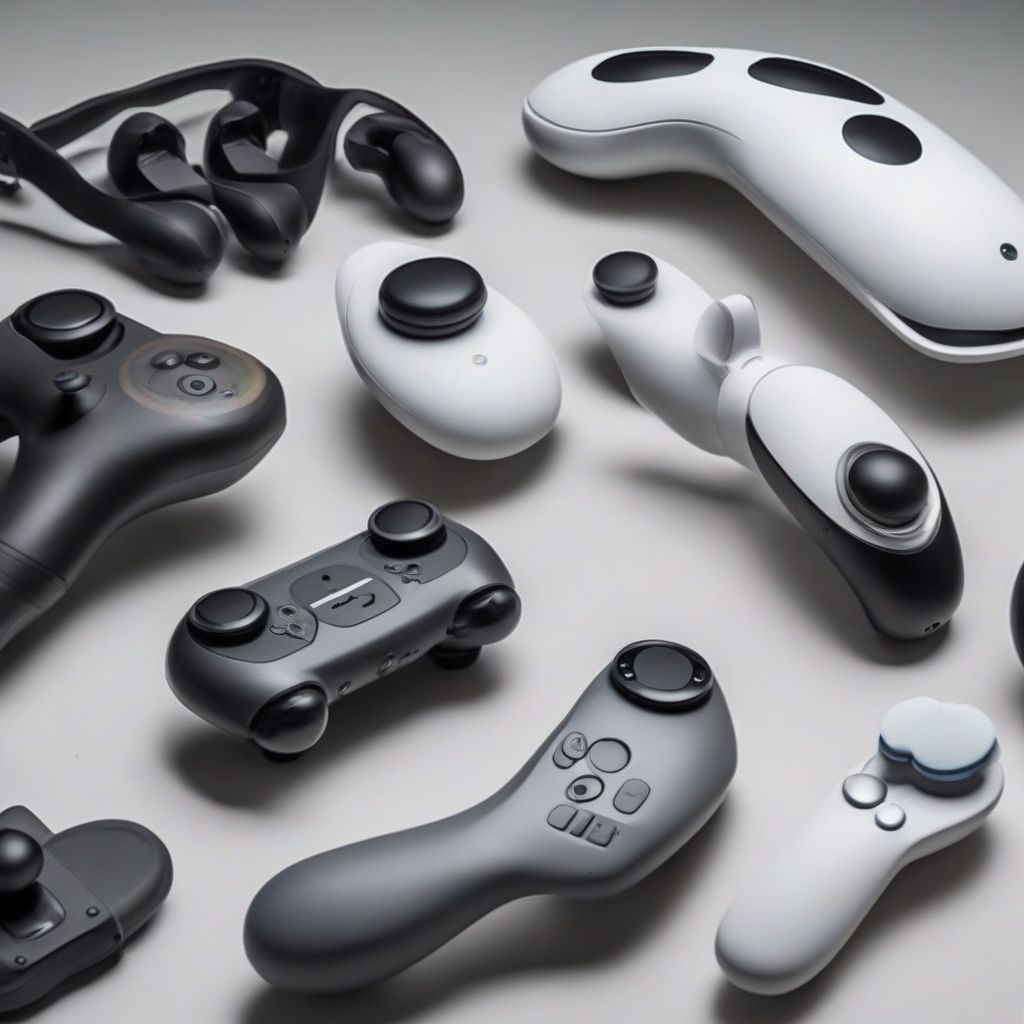Imagine stepping into a virtual world where your senses are ignited. You could be battling dragons, exploring ancient ruins, or painting masterpieces in a 3D space. But wait – something doesn’t feel right. Your virtual hands are clumsy, and the immersive experience is broken. That’s the power (and potential pitfall) of VR controllers. Choosing the right ones can make or break your virtual reality adventures.
Understanding the VR Controller Landscape
Before diving into game-specific recommendations, let’s break down the different types of VR controllers:
1. Hand Tracking
This cutting-edge technology allows you to ditch the controllers altogether and use your own hands to interact in VR. Sensors on the VR headset track your hand movements, translating them into in-game actions.
Pros:
- Immersive and intuitive: It feels natural to reach out and interact with the virtual world using your own hands.
- Enhanced social interaction: Hand tracking allows for more realistic hand gestures in social VR experiences.
Cons:
- Accuracy and tracking issues: Still in development, hand tracking can be finicky, especially with fast-paced movements.
- Limited functionality: Not all games and apps support hand tracking yet.
2. Motion Controllers
These controllers, typically held in each hand, offer a wider range of motion and buttons for a more interactive experience. They usually feature:
- Motion sensors: Track the position and orientation of your hands in 3D space.
- Buttons and joysticks: Provide input for actions, movement, and menu navigation.
- Haptic feedback: Delivers vibrations and sensations to your hands, adding a layer of realism.
Types of Motion Controllers
- 3DoF Controllers: (3 Degrees of Freedom) offer basic tracking of your hand’s rotation, suitable for simpler VR experiences and seated gameplay.
- 6DoF Controllers: (6 Degrees of Freedom) track both rotation and position, allowing you to move your hands freely in 3D space for a more immersive experience.
 VR Controllers
VR Controllers
[amazon bestseller=”VR Controllers”]
Matching Controllers to Game Genres
Now, let’s explore how to choose the right VR controllers for different types of games:
1. Action and Adventure Games
For adrenaline-pumping action and immersive adventures, you’ll want controllers that keep up with the pace:
Ideal Controllers: 6DoF Motion Controllers (e.g., Oculus Touch, Valve Index Controllers)
- Precision tracking: Essential for aiming weapons, swinging swords, and navigating complex environments.
- Ergonomic design: Comfortable to hold during extended gameplay sessions.
- Responsive buttons: Ensure quick access to weapons, tools, and actions.
Games to Consider: Half-Life: Alyx, Boneworks, Blade & Sorcery
2. Shooters (FPS and TPS)
Whether you’re a seasoned sharpshooter or a casual blaster, VR shooters demand accuracy and responsiveness:
Ideal Controllers: 6DoF Motion Controllers with analog sticks for precise movement (e.g., PlayStation VR Aim Controller, Valve Index Controllers)
- Aiming stability: Controllers with physical stocks or grips can improve accuracy.
- Haptic feedback: Feel the impact of every shot and the recoil of your weapon.
- Intuitive button layout: Quick access to reloading, weapon swapping, and other essential actions.
Games to Consider: Pavlov VR, Half-Life: Alyx, Onward
3. Simulation and Role-Playing Games
Step into the shoes of a chef, a surgeon, or a powerful wizard with VR controllers that enhance immersion and realism:
Ideal Controllers: 6DoF Motion Controllers (e.g., Oculus Touch, HTC Vive Wands)
- Precise hand tracking: Crucial for interacting with objects realistically, like handling ingredients, wielding tools, or casting spells.
- Button versatility: A variety of buttons and triggers allow for complex actions and menu navigation.
- Comfortable design: Essential for long gameplay sessions as you lose yourself in expansive virtual worlds.
Games to Consider: Job Simulator, Surgeon Simulator, The Elder Scrolls V: Skyrim VR
4. Creative and Social Experiences
Unleash your inner artist or connect with friends in virtual spaces with controllers that prioritize freedom of movement and expression:
Ideal Controllers: 6DoF Motion Controllers or Hand Tracking (depending on the app or game)
- Intuitive controls: Easy-to-use interfaces allow you to focus on creativity and social interaction.
- Hand tracking (optional): For more natural gestures and interactions in social VR experiences.
- Comfortable design: Important for extended use in social settings or creative endeavors.
Experiences to Consider: Tilt Brush, Google Earth VR, VRChat
Factors to Consider When Choosing VR Controllers
Beyond game genres, here are some additional factors to weigh when selecting VR controllers:
- VR Headset Compatibility: Ensure the controllers you choose are compatible with your VR headset.
- Tracking Technology: Inside-out tracking (sensors on the headset) offers more freedom of movement compared to outside-in tracking (external sensors).
- Battery Life: Consider how long the controllers can last on a single charge, especially for extended gaming sessions.
- Price: VR controllers range in price, so set a budget that aligns with your needs and the overall cost of your VR setup.
Conclusion
Choosing the right VR controllers is essential for unlocking the full potential of virtual reality gaming. By understanding the different types of controllers and considering your preferred game genres, you can elevate your VR experience.
Ready to immerse yourself in incredible virtual worlds? Explore the possibilities and find the perfect VR controllers to embark on your next adventure. And if you have any questions or need further guidance, feel free to share your thoughts in the comments below!
